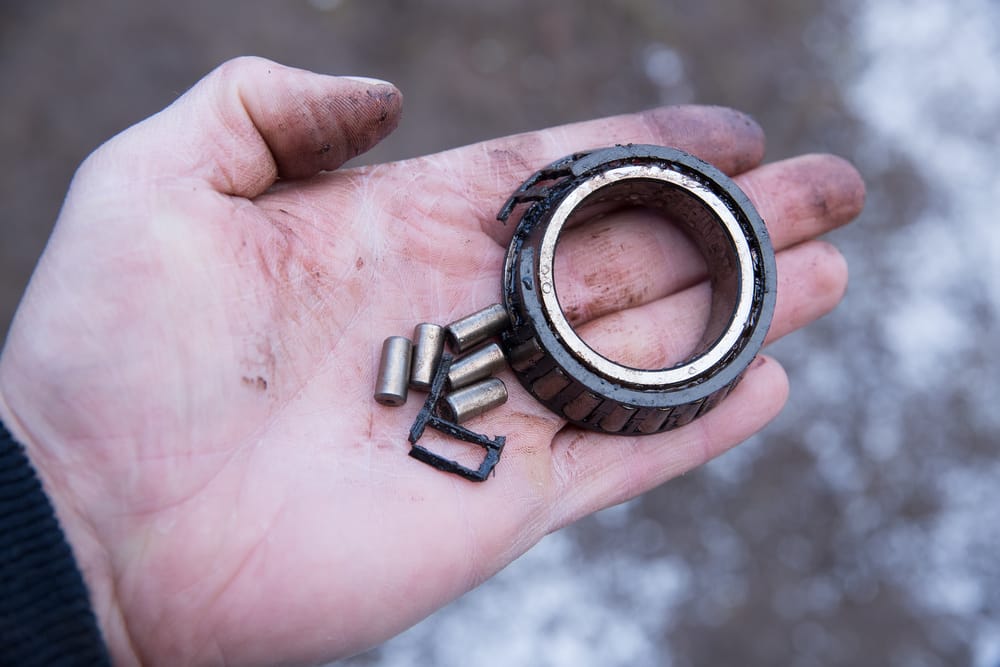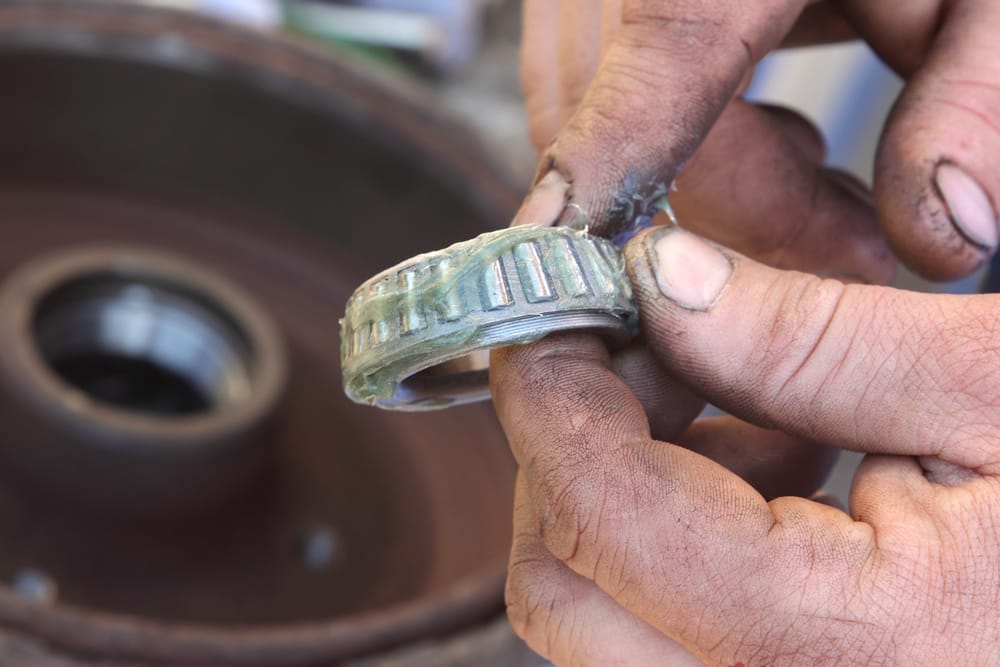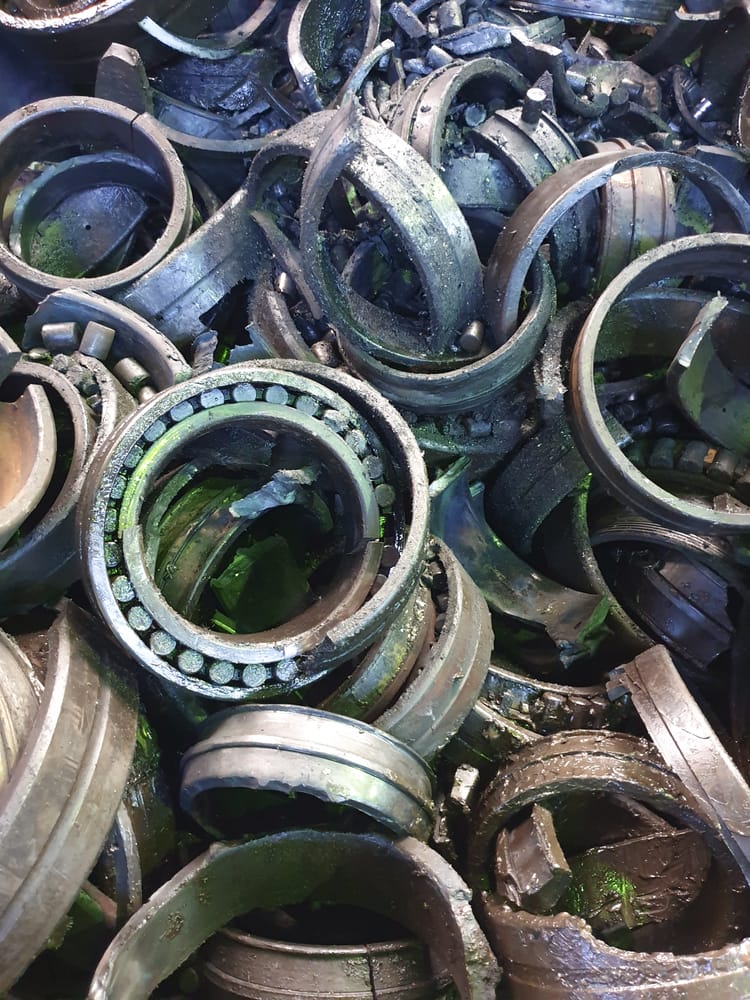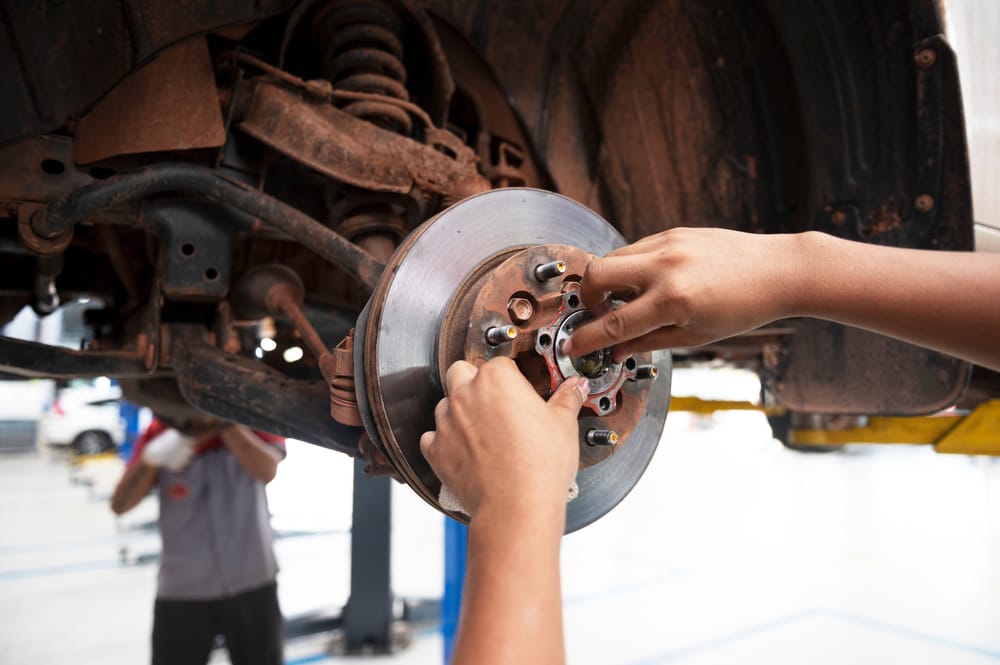Your car's wheel bearings are an essential part of the drivetrain. However,
since they are constantly in motion when you drive your vehicle, they can
wear down over time and cause problems.
A bad wheel bearing can affect your car's acceleration by causing extra
friction between the metal parts that are in contact with each other. A
bad wheel bearing can also cause too much drag on your axle if it can't
spin freely.
Read on to learn more about wheel bearings and how they can affect your
car's performance.
 A bad wheel bearing will affect acceleration and eventually fail.
A bad wheel bearing will affect acceleration and eventually fail.
What Are Wheel Bearings?
Wheel bearings are sealed metal discs that contain small metal ball
bearings or roller bearings that spin on a track called a "race."
These bearings are packed in grease to lubricate them and prevent friction
between the metal parts.
Wheel bearings are pressed into the hubs on a car's axle to support the
axle's weight at each end and still allow free movement when the vehicle is
being driven.
As the wheel bearings wear over time, they begin to break down and lose
their normal function.
Can A Bad Wheel Bearing Affect Speed?
There are a few ways that a bad wheel bearing can affect the speed of your
vehicle.
If the seals that hold the grease inside the bearing deteriorate, the
bearing will lose its lubrication. This will cause excess metal friction,
requiring more effort from your engine to keep the wheels turning.
A worn-out wheel bearing can sometimes lose some of the ball bearings
inside of it. If this happens, the rest of the bearings won't be able to
spin together like they're supposed to.
This will cause harsh vibrations as the remaining bearings bounce around
each other while in motion. This vibration is another way that your vehicle
speed can be affected.
Occasionally, a failed wheel bearing can lock up and stop spinning freely.
The engine will continue to power the wheels, but the locked-up bearing
will cause drag on the axle.
This drag will require much more force to keep the wheels moving, which can
significantly affect your vehicle speed.
 A mechanic packing a wheel bearing with grease.
A mechanic packing a wheel bearing with grease.
Can Bad Wheel Bearing Affect Transmission?
One serious downside of having a bad wheel bearing is the effect that it
can have on your car's transmission.
The extra friction and drag created by the bad bearing will be carried
through the whole drivetrain.
This can cause your transmission to work harder to account for the loss of
power, which can lead to premature wear.
The vibrations from the bad bearing can also damage the components of the
transmission.
Most modern automatic transmissions are built to handle some vibration from
the normal bumps in the road while driving.
However, the extra vibration from the wheel bearing may cause too much
strain on the transmission.
This is especially true if the damaged bearing isn't replaced quickly and
can continue vibrating for an extended period.
What Happens If You Keep Driving On A Bad Wheel Bearing?
If you continue to drive on a bad wheel bearing, several negative
consequences are possible.
The effects of the bad bearing can harm your vehicle's gas mileage and
performance.
The drag and vibrations from the bearing can damage many of the components
of your drivetrain.
Most importantly, a complete failure and separation of the wheel bearing
can cause you to lose control of your vehicle while driving.
This can be extremely dangerous and could lead to a severe accident.
Can Bad Wheel Bearing Affect Gas Mileage?
A bad wheel bearing can have a noticeable effect on your car's gas mileage.
Since your engine has to work harder to overcome the friction caused by the
bearing not rolling smoothly, it will use more gas to keep your wheels
turning.
 A pile of broken wheel bearings.
A pile of broken wheel bearings.
What Are The Signs That A Wheel Bearing Is Failing?
A failing wheel bearing will give you a few signs to watch and listen for.
Noises
A bad bearing could cause unusual noises around your wheels and axles.
These noises can sound different and get progressively worse, depending on
the condition of the bearing.
A slight squealing could be a bearing starting to leak its
internal grease, although the brakes could also cause this noise.
A bearing that has lost some of its rollersmay start to vibrate and cause a rattling or popping sound.
A bearing that has lost all of its grease and is starting to experience
metal friction will usually cause a loud groaning or grinding sound.
The noises a bad wheel bearing make will get louder or vibrate as the vehicle's speed
increase or
the vehicle turns, and the vehicle's weight shifts onto the bad
bearing
.
Visible Signs
You may also be able to see the signs of a bad wheel bearing.
A grease buildup around the bearing housing on the axle or wheel hub
indicates a bad wheel bearing.
What Does It Sound Like When A Wheel Bearing Is Going Out?
A bad wheel bearing will usually make a metallic squealing or screeching
sound.
Bearings can also make a loud grinding or groaning noise if they are badly
damaged and have run out of bearing grease.
 A mechanic installing a new wheel bearing.
A mechanic installing a new wheel bearing.
How Long Will A Wheel Bearing Last After It Starts Making Noise?
It's hard to predict how long a noisy wheel bearing will last.
Some bearings that are still mechanically sound could keep working for a
few more thousand miles, but they can also deteriorate quickly once they
begin to fail.
The only way to know the condition of your wheel bearing is to have it
checked by a professional mechanic.
They will give you a much better idea of the condition of your wheel
bearings.
How Long Can I Drive My Car With A Bad Wheel Bearing?
Again, this always depends on the condition of the bearing in question.
A bearing starting to leak grease may keep working for a while, but it's
only a matter of time before it runs dry and risks locking up or
separating.
If your wheel bearing is causing harsh vibrations or metallic grinding
noise, it should be replaced as soon as possible. Putting it off can cause
severe damage to your vehicle.
Limiting your driving to only emergency situations is important if you have
a wheel bearing that has reached this point of failure.
If you don't, you're gambling with your safety and the safety of those on
the road with you.
How Expensive Is It To Replace A Wheel Bearing?
The cost to replace a wheel bearing depends on your vehicle type.
Some vehicles have a hub assembly that contains wheel bearings that can be
removed and replaced without replacing the entire hub.
The bearings for these vehicles are usually cheaper, averaging between $50
and $100 for a single bearing.
However, these bearings must be removed and new ones pressed in place with
a special tool.
With the cost of labor included, this repair can cost around $200 or $300
to replace bearings on one hub assembly.
Other vehicles have a hub assembly with sealed bearings that can't be
removed.
You must replace these hubs as a whole if the bearing goes bad. A complete
hub and bearing assembly will usually cost anywhere from $100 to $300,
depending on the vehicle model.
Since these hubs are also best left to a mechanic to replace, the
additional labor cost can take the total cost of repair to $400 or $500 per
hub assembly.
Conclusion
Pay attention to a wheel bearing starting to go bad on your vehicle.
Ignoring a wheel bearing that is grinding or vibrating can end up causing
serious damage to your vehicle. It can also be a safety risk for you and
everyone you share the road with.
If you have a wheel bearing going bad, it's best to play it safe and get it
checked out as soon as possible!